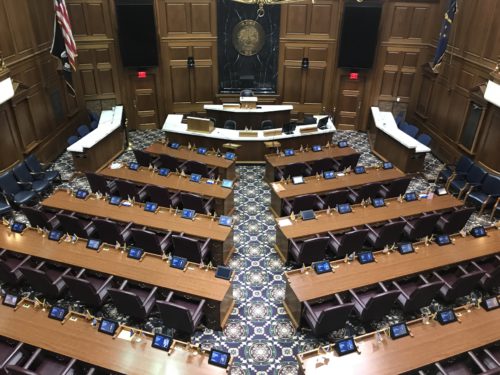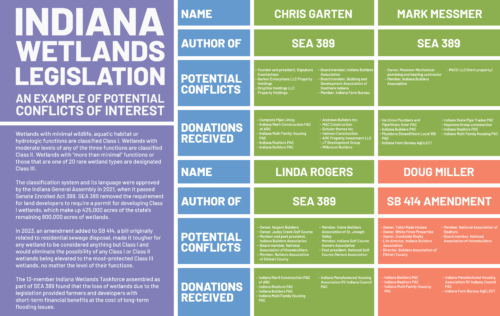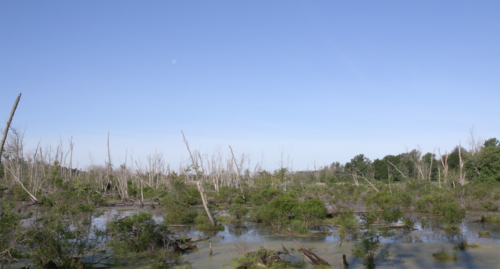By Sade Ajishegiri, Sophie Kaelble, Nic Napier, Lily Staatz, Jasmine Wright and Lizzie Wright
Arnolt Center for Investigative Journalism
INDIANAPOLIS – The authors of a 2021 wetlands bill benefiting home builders had common interests: all had ties to the home construction industry.
Similarly, bills that gave fossil fuel-using industries new ways to tap into benefits reserved for clean energy projects were introduced by lawmakers that received contributions from and with financial connections to those industries.
But in Indiana, little prevents lawmakers from pushing legislation that could benefit their business interests.
The Indiana General Assembly is passing more laws tied to environmental matters, while many of those same lawmakers have economic interests in the building trades, utility companies and real estate firms, and receive large sums of campaign donations from the industries that stand to benefit most from the laws.
The Arnolt Center for Investigative Journalism and the Indiana Environmental Reporter reviewed statements of economic interest filed in 2022 by state lawmakers and more than 100 bills enacted from 2019 to 2022. Many of these bills benefit industries the authors have ties to, creating the appearance of a conflict of interest.

Even the perception of a potential conflict of interest erodes trust in democracy, said Sheila Kennedy, professor emerita at the Paul H. O’Neill School of Public and Environmental Affairs at Indiana University.
“There’s an immense amount of research that shows that without a fundamental level of trust you don’t have democracy, you don’t have workable government,” she said.
But few consequences exist for legislators in Indiana with potential conflicts of interest, as long as they disclose them in their statements of economic interest, Kennedy said.
“Absent somebody being able to bring a lawsuit, I know of nothing other than media attention to it, and a subsequent electoral challenge,” she said. “We are not a particularly ethical state.”
The 2021 wetlands legislation stripped away protections for isolated wetlands across the state. The law – SEA 389 – eliminated the need for a permit to conduct “wetland activity.”
Representatives of the construction and agricultural industries, including the Indiana Builders Association, strongly opposed wetlands protections that they said would restrict their ability to build or farm where they wanted.
Sen. Chris Garten, R-Charlestown, owns Signature Countertops, Sen. Mark Messmer, R-Jasper, owns Messmer Mechanical, a plumbing and heating company, and Sen. Linda Rogers, R-Granger, is president of Nugent Builders Inc., according to their disclosure forms. Garten, Messmer and Rogers authored the wetlands bill.
Messmer is an Indiana Builders Association member and Rogers and Garten are on its board of directors. Rogers also was the president of the association in 2015, and served on the National Association of Homebuilders board, according to the Indiana Senate Republicans website.
Environmental justice advocates objected to Indiana Builders Association members influencing environmental policy.

Graphic by Melanie Quinn Roberts.
“Several of them serve on the state Legislature,” said Susan Thomas, legislative and policy director for Just Transition Northwest Indiana, an environmental justice organization. “Think there’s a conflict of interest there?”
Garten did not respond to multiple emails and calls requesting for comment. Messmer and Rogers declined to comment.
The law removed about half of the 800,000 acres of wetlands from state regulations, putting wetlands across Indiana that reduce flooding and improve water quality in a vulnerable position, according to the Nature Conservatory.
“When you get rid of wetlands you are increasing flooding,” Thomas said. “This is just going to make costs go through the roof for Indiana, in terms of cleaning up flooding and managing that.”
More than 100 organizations asked the governor to veto the bill after the General Assembly passed it, said Indra Frank, director of environmental health and water policy for the Hoosier Environmental Council.
“We’ve already lost about 90% of wetlands due to civilization and the average annual increase of 5.5 inches of precipitation due to climate change is arriving in heavy storms,” Frank said. “This is where wetlands can provide the most help. We need our wetlands more than ever in response to climate change.”
FEW TEETH EXIST IN INDIANA DISCLOSURE LAW
Indiana lawmakers must submit statements of economic interest at the start of each legislative session. Their employers, businesses they own or have stake in, lobbyists they have relationships with and government agencies they’re affiliated with are all disclosed in the annual filings.
Despite the legal requirement for disclosure, little in state law precludes legislators from pushing bills tied to their economic interests.
Any complaints against a lawmaker are referred to ethics committees in the Senate and House. The Senate Ethics Committee hasn’t met since January 2019, according to the General Assembly’s website. The House Statutory Committee on Ethics met in January 2023 to adopt a code of ethics – it was the first time the committee had met since 2019.
“When looking at legislators and their business ties, you have to come from a place where they might just be passing a bill because they understand that industry,” said Zach Baiel, president of the Indiana Coalition for Open Government. “It’s tricky because it’s not to say some legislators are pushing for a bill due to the fact that they’re contributors and lobbyists are pushing for it.”
All 50 states have public records law that apply to government agencies at the state and local level, but many legislatures partially or fully exempt themselves from disclosure, according to the National Conference of State Legislatures. Legislatures are fully exempted from transparency laws in 12 states.
The Indiana General Assembly must comply with the state Access to Public Records Act, though work product of its members and partisan staff can be exempted from disclosure, according to state law.
Indiana has routinely scored low on rankings of state transparency law.
The Center for Public Integrity ranked Indiana number 29 for transparency, according to a 2015 study. The nonprofit organization gave a “D” average in executive, legislative and judicial accountability.
The Coalition for Integrity, another nonprofit group, ranked Indiana 44th in the nation for anti-corruption measures for public officials, according to the 2020 States with Anti-corruption Measures for Public Officials Index.
In recent years, the Legislature has tightened open records law, making it more difficult for citizens to access information about their government, Baiel said.
“How does anyone ensure that we get the most out of our government?” Baiel asked.
Conflicts extend beyond wetlands legislation
Sen. Eric Koch, R-Bedford, was the main author on more than 20 environmental bills during the last four years. While his sole employer is his law firm, Koch disclosed a financial interest in more than 400 companies through public stocks and six more through private stocks.
He disclosed shares in numerous oil and gas companies in 2022. Chevron, Exxon Mobil, Marathon Petroleum and Royal Dutch Shell are a few of the more than 40 fossil fuel companies listed on Koch’s conflict of interest disclosure form.
Koch did not respond to multiple emails and calls for comment.
Koch authored SEA 411 in 2022, which creates guidelines for communities to be considered wind energy ready or solar energy ready. Those guidelines aren’t forced on communities though, and therefore do not impact the more than 30 counties that restrict wind and solar projects.
Similarly, Koch authored SEA 390 in 2023, which incentivized communities to adopt wind and solar guidelines without forcing adherence to them. As of February, no counties met the solar guidelines and only two counties met the wind guidelines, according to a Purdue University study.
In 2022, Koch received donations from various renewable energy companies, including NextEra Energy, Invenergy, Solv Energy LLC, and EDP Renewables North America, according to campaign finance filings. Along with this, Koch also receives donations from and invests in various natural resource companies and working groups.
Koch authored SEA 271 in 2022, which allowed the construction of small modular nuclear reactors that take up less space than their larger energy-producing counterparts. These reactors can be built in retired coal or gas plants. The bill also gives financial incentive to companies that build them.
Duke Energy, which donated $6,500 to Koch’s campaign in 2022, has been working with Purdue University to test the feasibility of using a small modular nuclear reactor to power the West Lafayette campus. The recent interim report doesn’t contain plans for construction, but does recommend it as one option to move Purdue toward zero emissions.
Koch also authored SEA 147 in 2022, which added underground pumped storage hydropower in places such as abandoned coal mines, quarries, and other suitable places.
Koch isn’t alone in authoring bills that mirror his financial interests. Other examples include but are not limited to:
- Sen. David Niezgodski, D-South Bend, co-authored a carbon sequestration bill in 2019. The bill – SEA 442 – established a pilot project in Terre Haute. Carbon sequestration is a process by which carbon dioxide is captured from the atmosphere and injected deep underground to prevent it from furthering the effects of climate change.
Carbon sequestration requires the installation and expansion of carbon dioxide pipelines, and Niezgodski Plumbing, the company Niezgodski retired from and is formerly the president of, has a “gas line installation” service and does light commercial and residential plumbing, according to his disclosure form.
Niezgodski did not respond to multiple emails and calls requesting comment.
- Rep. Jim Pressel, R-LaPorte, authored HEA 1245 in 2022 which makes the build and use of county septic ordinances less restrictive than the state’s regulations. County health departments are now prohibited from denying applications for a permit for a residential sewage system if they are approved by an engineer, soil scientist, and residential onsite sewage system installer, making public health less of a priority.
Pressel is the owner of Pressel Enterprises, a home building business in LaPorte, according to his disclosure form. His business deals with home building from start to finish, including residential construction of sewage and water systems. He’s also a board member of the Indiana Builders Association.
Since Indiana has a citizen Legislature, it is made up with home builders, dentists, doctors, teachers and trade professions who all have their own expertise, Pressel said in an interview.
“I’m one of those experts, especially in the sewer and wastewater” Pressel said. “So, unless you’re going to be full time and only depend on trade associations outside of the Legislature, or totally rely on lobbyists, that’s what makes Indiana such a great Legislature because we are made up of multiple different industries or professions.”
Pressel said through his experience as a homebuilder and his work with industry organizations has helped him identify problems that can be solved through legislation. Without professionals with that knowledge, legislators would rely solely on lobbyists or other interest groups, he said.
- Representatives Don Lehe, R-Brookston, and Mike Aylesworth, R-Hebron, co-authored HEA 1283 during the 2021 session, which gave farmers the ability to have special tax benefits as long as the body is designated as an “urban agricultural zone.” Both own farms in Indiana.
Lehe owns Lehe Farms Inc. in Brookston, where specialty crops, commercial grain, show cattle and commercial cow/calf are grown and raised, according to his disclosure form. Aylesworth owns Aylesworth Farms Inc. in Hebron, which is listed as a domestic for-profit corporation whose main focus is oil seed and crop production, according to his disclosure form.
Lehe and Aylesworth did not respond to multiple emails and calls requesting comment.

A view of wetlands in Pines, Indiana. Photo by Beth Edwards.
INDIANA INCHES TOWARD MITIGATING CLIMATE CHANGE IMPACTS
With the acceleration of climate change, the stakes in environmental legislation are immense.
“Climate change is a threat to human well-being and planetary health,” according to a March report from the Intergovernmental Panel on Climate Change. The panel combined research from thousands of scientists and used it to advise the 195 member governments on climate policies.
Indiana is projected to see more hot days in the summer and wetter springs and winters, according to Purdue University’s Indiana Climate Change Impacts Assessment. Moderate emissions projections show Indiana summers feeling more like current summers in Tennessee by the 2050s.
The intergovernmental panel advised governments that mitigation is possible.
“There is a rapidly closing window of opportunity to secure a livable and sustainable future for all,” according to the IPCC report.
Jeff Dukes, former director of Purdue’s Climate Change Research Center, which authored the impacts assessment, said policymakers should consider policies to incentivize people to act in ways that minimize climate change’s impacts by adapting to the changes already underway.
“I think that outside economic forces are pushing in the right direction,” Dukes said. “And so you see increasing amounts of solar and wind in Indiana, and you see slowly increasing adoption of electric vehicles in Indiana. But it’s very slow.”
That slow progress may be attributable in part to legislative decisions. While major power companies such as Duke Energy and the Northern Indiana Public Service Co. push toward renewable energy sources, Indiana legislators continue to bolster the coal industry, passing legislation in March that could make it harder for utilities to close their coal plants.
“I think that things are moving in the right direction in Indiana, but I don’t think that Indiana is necessarily helping that process,” Dukes added. “It’s, I would say, allowing the changes to happen on some scale. But it’s not really incentivizing these changes.”
Samantha Latson, Marisol Sanchez, Nadia Scharf, Rebekah Shultz and Lauren Ulrich contributed to this story.
This story was written by journalists at the Arnolt Center for Investigative Journalism at Indiana University in partnership with the Indiana Environmental Reporter.


